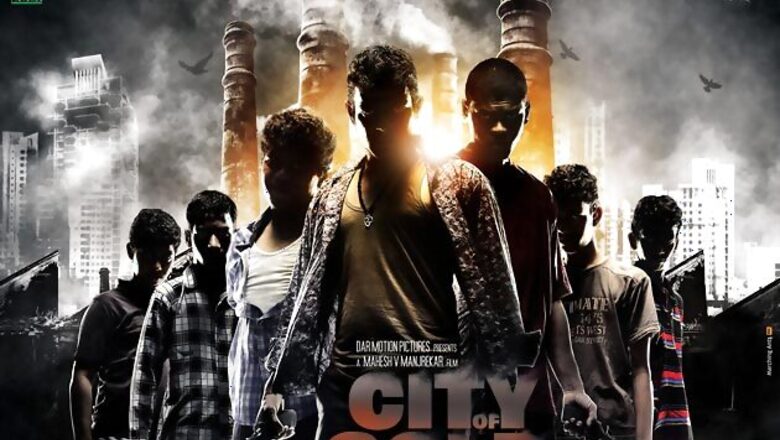
views
While passing the huge swanky malls, multi-storied apartments and hot shot nightclubs in the Lalbaug-Parel belt in Mumbai, one cannot imagine what originally stood there just 15-20 years back. This entire belt was actually a majestic mill zone. Mahesh Manjrekar's Hindi-Marathi bilingual City of Gold takes us back to the early '80s, narrates the tale of the impact of degeneration of Mumbai's once thriving textile industry, on the lives of the family members of mill workers.
Adapted from Jayant Pawar's successful Marathi play Adhantar, the film focuses on the lower middle class family of Dhuris. Anna Dhuri (Shashank Shende) is a mill worker in Khaitan Mills and stays with his wife (Seema Biswas) and four children in the mill workers' ghetto in Central Mumbai. His elder son Baba (Ankush Chaudhary) is a talented but frustrated writer; his cricket fanatic middle son Mohan (Vineet Kumar) is a bank peon, and daughter Manju (Veena) works in a beauty parlour and is having an affair with the local grocer's son. His youngest son Naru (Karan Patel) does odd jobs for the underworld.
The mill owner Khaitan (Kishore Pradhan) and his over ambitious son-in-law Mahendra (Sameer Dharmadhikari) are hand-in-glove with the concerned ministry and have sinister plans to convert their huge mill land into a lucrative real estate property. Even if that means complete shut down of their mill forever and laying off thousands of workers by paying them peanuts.
Sniffing a conspiracy, the trade union spear headed by Rane (Sachin Khedekar) calls for a strike but ends up playing into managements hands. Along with many affected families, hard times hit the Dhuri family after the mill is shut down. How it throws everyone's life out of gear, with many choosing their own path to doom forms the rest of the film.
Manjrekar has collaborated with Jayant Pawar on the screenplay and incorporated a few changes to the original play. It is a difficult film to write, as it tries to pack in a lot of things, and has to deliver an impact of each of the topic it has chosen to. But the writer duo succeeds.
The often witty and sarcasm laden dialogues work given the milieu of the film. But one sorely misses Mohan's striking reply to Baba about his cricket fanaticism which was in the play.
The violent child gang of the unemployed mill workers often draws parallels to the one in the Brazilian film City of God (2002). However, in an attempt to give the audience a real life experience, the violence (especially in the torture sequence) goes a little over board.
Also, City of Gold needed to have wound up after the shootout on the beach but stretches exasperatingly diluting its climactic punch.
Manjrekar's gritty treatment makes the film more impactful. Handling over 60 characters, big and small, is no easy task but he has effortlessly managed to do that. Attention to detail in reprising the Mumbai of the '80s, ideal casting and performances lift the film to many levels.
COG has an ensemble cast comprising the best talents from the Marathi cinema and theatre circuit apart from actual mill workers' children. The most impressive acts being from Siddharth Jadhav playing Speedbreaker - the stammering right hand man of Naru, Seema Biswas, Karan Patel, Vinay Apte and Sameer Dharmadhikari.
Manjrekar's favourite Sachin Khedekar is outstanding as the ever optimistic but ineffective union leader. The sequence where he breaks down after being insulted by his wife hits the right emotional notes. Dhuri family neighbours played by Satish Kaushik and Kashmera Shah who plays his promiscuous wife are apt in their roles.
The haunting background score often reminds of Manjrekar's Vaastav and enhances the impact in key sequences.
Because of its setting and varied dialects used, the film is more effective in Marathi (Lalbaug Parel) than in its Hindi version, but nonetheless makes for a compelling watch due to its performances and hard hitting sequences.
There are so many aspects to the story that one can actually make a separate film on each of them. More importantly it's a grand comeback for actor-filmmaker Mahesh Manjrekar to Hindi film direction after five years.
COG is highly recommended for those who like raw and gritty cinema with a touch of realism.
While not all mill lands in Central Mumbai that got redeveloped into prime real estate properties had a crime behind them, the truth remains that for many of the mill workers' family members that were promised employment, it still remains a dream.
Rating: Highly Recommended



















Comments
0 comment